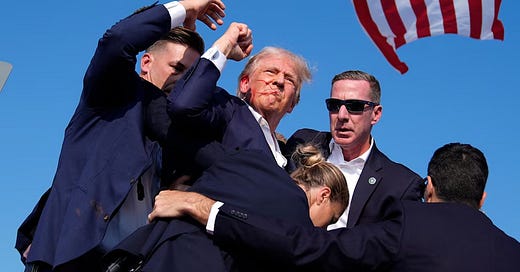Civility, Hyperbole, & Democracy
By Neil Gonsalves | An assassination attempt on a political leader, even one you may detest, inflicts harm on civility and democracy.
Written by Neil Gonsalves for Seeking Veritas on Substack
On July 13th, 2024 former US President Donald Trump narrowly survived an assassination attempt at a presidential campaign event. He becomes the third American President to have suffered an injury as a result of an unsuccessful attempt along with Theodore Roosevelt in 1912, and Ronald Reagan in 1981. - Four sitting US Presidents have been killed, Abraham Lincoln in 1865, James A. Garfield in 1881, William McKinley in 1901 and John F. Kennedy in 1963. In every one of these incidents, notwithstanding the physical and psychological impact to the actual human holding the office, the greatest harm inflicted was to civility and democracy.
When hyperbole polarizes a society and fills people with so much rage and hatred for the “other” side, we lose the greater value and purpose of democracy itself. It may not seem self evident in the age of social media (where political elections more closely resemble ‘WWE Grudge Matches’ rather than a competition for ideas), but democracy is rooted in compromise and respect for the collective voice. It is meant to be a competition for the best ideas as agreed upon by vote, the antidote to monarchy and authoritarianism, the guard rail against totalitarianism.
Polarization depends on our capacity to remain abstract in our vitriol. When political parties get entrenched in tribalism, greater energy is expended voting out our adversaries rather than voting in the best options. The point of opposition is to allow dissent and meaningful discourse to elevate the value of all our policies, to come together in the end to create more inclusive governance that better serves the people. When the vote doesn’t go our way, we get to try again at the next election.
The current political climate has devolved into an “us versus them” binary, a zero sum game that only leads to a race to the bottom. Leaders and political operatives who peddle in hate mongering and fear contribute to the erosion of civility. Hyperbole makes for great click bait but fails to provide meaningful political change. The practice of “othering” our political opponents needs to stop so sensible discourse about actual issues can occur. We cannot rely solely on political leaders to make these changes, everyone has a part, an informed citizenry is the strongest foundation upon which to build an effective democracy.
I don’t agree with much of Trump’s policy positions, I dislike his general modus operandi, and detest his willingness to erode the professionalism of public office but attempting to assassinate him is not the answer. That act of violence itself is an affront to democracy, an insult to every voting member of that nation who does their part in securing a better future for their country by casting a ballot instead of a bullet.
Unfortunately, this heinous attempt on Trump’s life, regardless of what we think of him as a person, is more likely to embolden the already polarized masses. Where a lesson could be learned about extremes, I fear it will be a rallying cry to double down. The image of his bloodied face and arm held up in defiance will make for an effective political statement that fires up his base and quite possibly swings the election in his favour. Whether or not he gets re-elected, should not detract from our collective need to reduce polarization.
Today is a good day to remember the character of a former US presidential candidate, the late John McCain. In the face of vitriolic hate and misinformation directed against his political opponent, he demonstrated civility and a commitment to democracy.
When McCain encountered a voter he could confidently count in his column, who suggested Obama was an Arab who couldn’t be trusted, he took the microphone back and calmly reminded her that she was wrong, that his opponent was a decent family man, a fellow citizen, even if they disagreed on the fundamentals of how to govern. - That should be the standard of class and civility. It was a masterclass in rejecting hyperbole and showing respect for those we disagree with.
Our children will be the beneficiaries of a better world if all of us commit to turning down the volume on rhetorical nonsense and demonstrate civility toward those we disagree with. - Our children need to see us say, violence is not the answer and does little to create lasting social change, the ballot box is where they will one day make themselves heard.
About the author: Neil Gonsalves is an Indian-born Canadian immigrant who grew up in Dubai, U.A.E. and moved to Canada in 1995. He is an Ontario college educator, a TEDx speaker, an author and columnist, a recreational dog trainer and an advocate for new immigrant integration and viewpoint diversity.
Seeking Veritas on Substack | Sankarsingh-Gonsalves Productions. 2024 ©️






I love that you held up McCain as the standard of a political statesman - he was not perfect in many of his policies, but he was always a gentleman. We've lost that quality in our leaders so long ago now that it almost seems like a fairy tale to talk about the days when political leaders were a little less divisive.
I did like your piece. I don't typically say much about 'politics', and I still won't. What I will say however, is, We the People have been inundated by the media with the incivility of political figures towards each other, often using litotes for effect one way or the other. Oh and that democracy thing, like may other things, looks good on paper, but when was the last time it was ever used correctly?